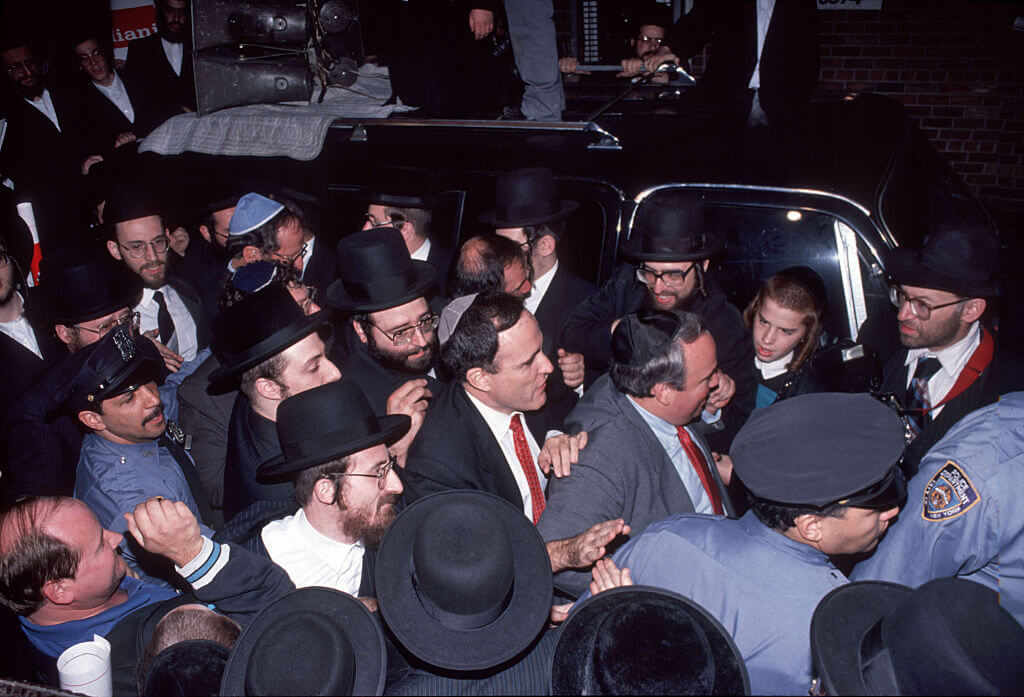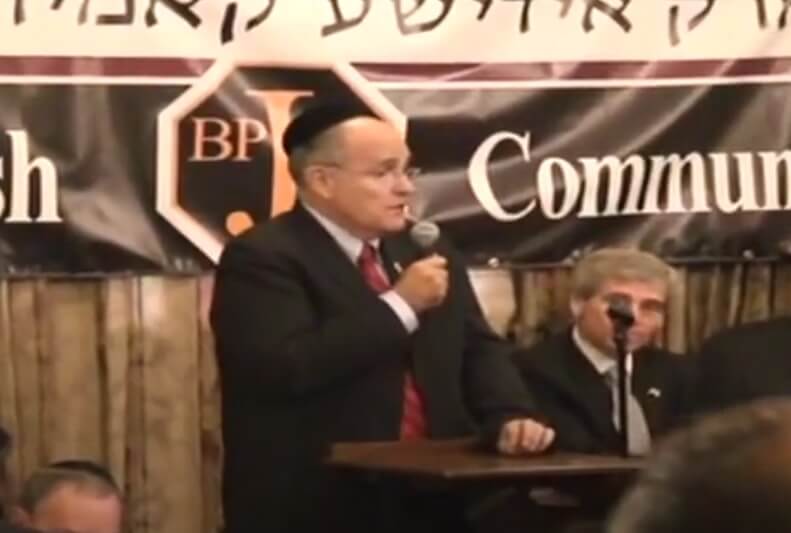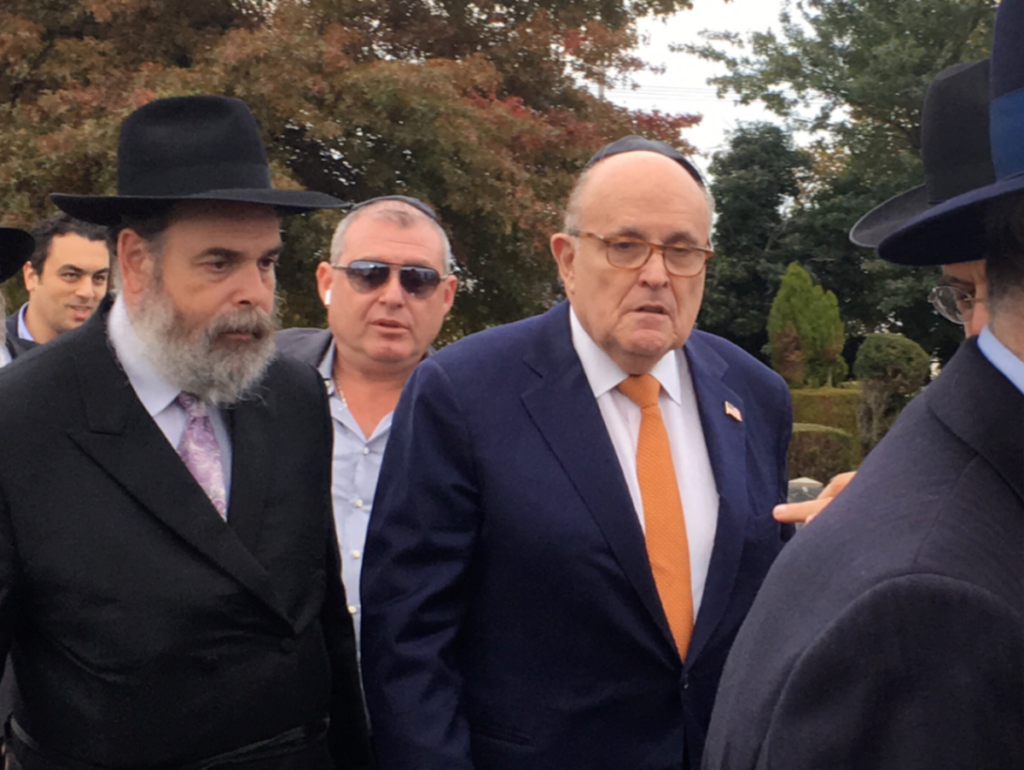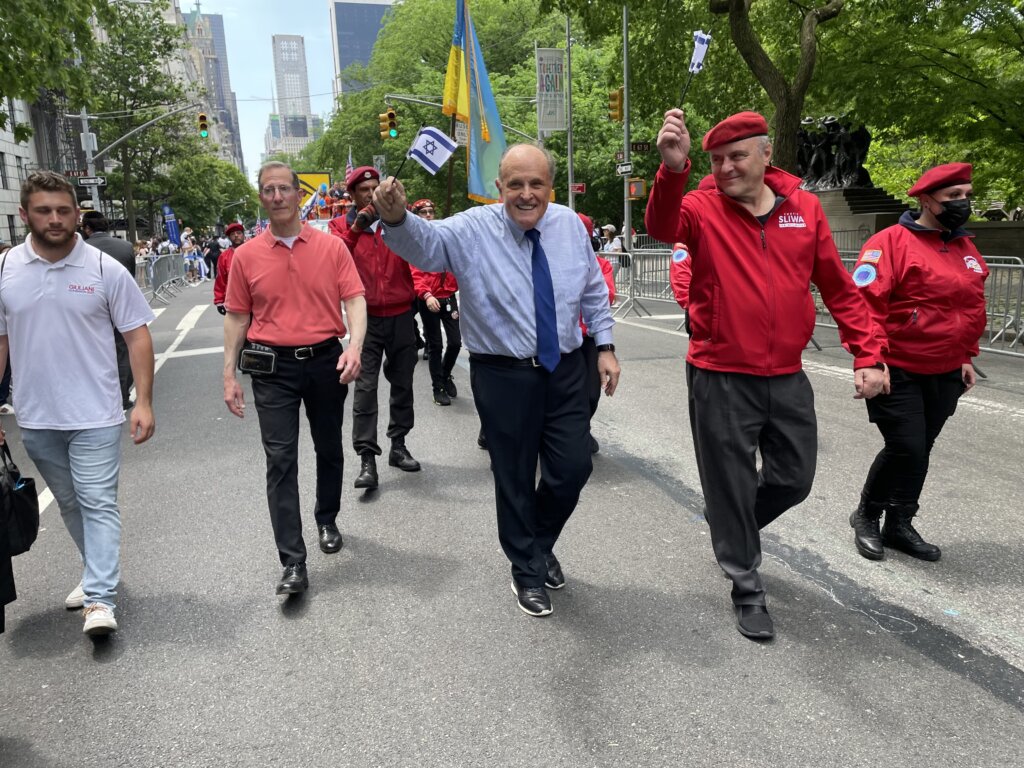Shocked about Giuliani’s attack on Passover? Here’s a quick history of his relationship with Jews
During four decades in the public eye, the former New York City mayor has both connected with and revolted Jewish New Yorkers

Rudy Giuliani, as a mayoral candidate visits the Orthodox community in Brooklyn on Oct. 25, 1989. Photo by Allan Tannenbaum/Getty Images
Rudy Giuliani’s alleged mocking of Passover, and disparaging of Jews’ genitalia, inspired outrage and contempt when they were revealed as part of a lawsuit filed against him Monday.
“As is tradition, every Passover, we read about the four sons: The Wise Son, the Simple Son, the Son Who Does Not Know How to Ask, and Rudy Giuliani,” tweeted Yair Rosenberg, a staff writer at The Atlantic.
But those who have known Giuliani, or followed his career from prosecutor to New York mayor to former President Donald Trump’s lawyer, found the attack on the Jewish holiday less than shocking.
Dov Hikind, a former Brooklyn assemblyman and ally of Giuliani in the early 1990s, said he was “not at all surprised” when he read Giuliani’s purported comments from the suit, which was brought by a former employee who accused him of sexually abusing her.
”I guarantee you this is not the first time that he has said something like this, but everyone has managed to keep it pretty well hidden,” he said. “He was a great friend of the Jewish community, but sometimes when you rub a little bit on certain people, things come out,” he said.
The complex Giuliani-Jewish alliance
Giuliani’s relationship with the Jewish community goes back more than four decades, to his time as U.S. attorney for the Southern District of New York. Then, Giuliani and Jewish New Yorkers were mostly on friendly terms, though Jewish voters tend to opt for Democrats, and Giuliani is a Republican. As a prosecutor, he traveled to Israel on a mission sponsored by the Jewish Community Relations Council. And he pleased many mainstream Jewish groups in 1988 by taking legal action to force the Palestine Liberation Organization to close its observer mission to the United Nations.
Despite Jewish voters’ Democratic leanings, Giuliani in his first mayoral bid made more inroads with them than many Republicans have. That was likely due in part, however, to Democratic rival David Dinkins’ ties to the Rev. Jesse Jackson, whom many Jews perceived as antisemitic and anti-Israel. Giuliani ran an ad in 1989 in a Yiddish newspaper, the Algemeiner Journal, which featured a picture of Dinkins with Jackson and also included a “personal message to the Jewish people” on Rosh Hashanah.
On Manhattan’s Lower East Side, home to many observant Jews at the time, Giuliani garnered 72% of their vote. The more Orthodox neighborhood of Borough Park, in Brooklyn, gave him 87% of its vote.
Giuliani faced a Jewish opponent in the primary of that first mayoral race. Former Republican Sen. Alfonse M. D’Amato encouraged Ronald Lauder, who is Jewish and now heads the World Jewish Congress, to challenge Giuliani. Lauder, who spent $13 million in negative ads, lost by 2-1 margin but ran as the Conservative Party’s nominee in the general election. The New York Post, which endorsed Giuliani, ran articles highly critical of Lauder.
During the 1989 campaign, Giuliani was accused of trafficking in antisemitism as a prosecutor. After charging Jewish lock manufacturer Simon Berger in 1986 with mail fraud and conspiracy, Giuliani’s office allegedly forced the Holocaust survivor to face a blackboard on which was written the German words “Arbeit Macht Frei.” The slogan appeared on a gate at the entrance to the Auschwitz concentration camp.
The New York Post ran the headline, ”Auschwitz survivor charges Rudy’s men acted like Nazis.” Giuliani said he knew nothing about the incident and called it “reprehensible.”

Giuliani dramatically increased his share of the Jewish vote in his successful 1993 mayoral bid, defeating Dinkins, after the incumbent mayor suffered criticism over his handling of the riots in the Crown Heights neighborhood of Brooklyn in the summer of 1991. Giuliani garnered 70% of Jewish ballots, up from 45% in the previous election, including nearly 100% of the Jewish vote in Orthodox neighborhoods.
In 1997, Giuliani, who was running for reelection, apologized for criticizing his Democratic rival Ruth Messinger, who is Jewish, because she missed a Columbus Day Mass.
Hikind, who backed Giuliani for mayor but feuded with him in the late 1990s over a corruption scandal — the assemblyman was acquitted — today sees a very different Giuliani. The former mayor in recent years seems to have “lost it” and needs psychological help, he said.
Drinks and rants
Giuliani’s drinking problems got him into trouble in the past, but have worsened in recent years and cropped up as he backed Trump’s efforts to deny the results of the 2020 presidential election.
He also was reportedly under the influence of alcohol during incidents related to Jews.

Geoffrey Berman, the former U.S. attorney for the Southern District of New York who was fired by former President Donald Trump in 2020, revealed in his recent memoir that Giuliani scolded an Orthodox Jew, mistaking him for a Muslim, while having dinner with some clients at a Manhattan restaurant in 2016.
Berman, who was a partner of Giuliani at the Greenberg Traurig law firm, described a drunk Giuliani ranting about Islam when one of the clients — whose family emigrated from Egypt and who was wearing a yarmulke and had ordered a kosher meal — confronted him and said he was familiar with Islam and that it was not a violent religion.
“I’m sorry to have tell you this, but the founder of your religion is a murderer,” Giuliani shot back, mistaking the client for a Muslim man, even though the former two-term mayor “was clearly acquainted with Jews,” Berman wrote.
Antisemitic tropes
Giuliani set off a firestorm in 2019 for suggesting that his ongoing personal attacks against Jewish billionaire George Soros should not be considered antisemitic because the Hungarian-born Holocaust survivor is not religious. “Soros is hardly a Jew,” he told the New Yorker. “I’m more of a Jew than Soros is.”
In a text message to NBC News, Giuliani responded to the criticism, saying, “I’m more Jewish than half my friends.”
Mayor of Anatevka
In a video published in 2018, Giuliani can be seen at the former Trump International Hotel in Washington, D.C., with his former associates Lev Parnas and Igor Fruman. The former mayor, his shirt open and his tie unknotted, speaks with a Ukrainian rabbi they had met.
“Moshe, how are you baby?” Giuliani said in the video to Rabbi Moshe Azman, chief rabbi of Ukraine, as he waved his hand and laughed. Azman is head of the Anatevka Jewish Refugee Community in Ukraine, named for the fictitious town in Fiddler on the Roof. Parnas and Fruman served on its board and were indicted in 2019 on campaign finance charges. Azman later appointed Giuliani “honorary mayor of Anatevka.”
A changed man?
Last year, Giuliani got into a shouting match with a bearded onlooker during the annual Celebrate Israel parade down Fifth Avenue, calling the man a “jackass,” “brainwashed” and “probably as demented as Biden.”

Michael Miller, the former longtime chief executive of the JCRC, said Giuliani’s comments, as reported in the recently filed lawsuit, “do not reflect the Rudy Giuliani whom I knew and worked with” as a public official.
Jeffrey Wiesenfeld, a private wealth manager who worked on both of Giuliani’s mayoral campaigns, said “it’s very sad to watch” what has happened with Giuliani “because he did great things for the city and great things for the Jews.” Wiesenfeld suggested the alleged remarks may be the result of his alcohol consumption.
“I feel bad for him,” he said.















